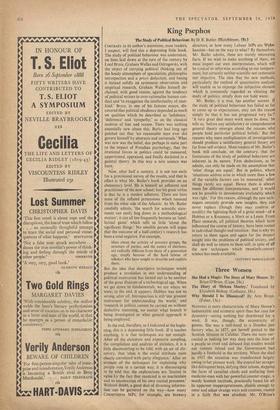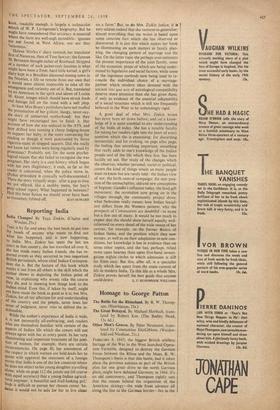, Three Women
The Diary of 'Helena Morley.' Translated by Elizabeth Bishop. (Gollancz, 18s.)
NOTHING is more characteristic of Mary Slessor's indomitable and eccentric spirit than her cure for dysentery—eating nothing but shortbread for a week. It was, though, the eccentricity of genius. She was a mill-hand in a Dundee jute factory who, in 1875, got herself posted to the Scottish Mission in Calabar. There she soon suc- ceeded in making her way deep into the lives of a people so cruel and debased that traders would not venture inland and the Government had hardly a foothold in the territory. When she died in 1915 the situation was transformed largely owing to her pioneer work. She treated her savages like delinquent boys, defying their taboos, slapping the faces of cannibal chiefs and outfacing their medicine-men with her powerful counter-magic, a sturdy Scottish rectitude, practically based for all its apparent inappropriateness, pliable enough to enter and adapt strange ways and customs, rooted in a faith that was absolute. Mr. O'Brien's
book, readable enough, is largely a technicolor rehash of W. P. Livingstone's biography. But he might have remembered that accuracy is essential Where the facts are well-nigh. incredible : iguanas are not found in West Africa, nor are they venomous.'
'Helena Morley's' diary reminds her translator first of Nausicaa, then of Tom Sawyer; the famous M. Bernanos thought rather of Rimbaud. Stripped of a number of such jacket-rash fatuities is what might have been a fresh, hard little kernel, a girl's diary kept in a Brazilian diamond-mining town in the Nineties, a life so remote from our own that it would seem almost impossible to take all the strangeness and curiosity out of it. But, translated by an American in the spirit and idiom of Louisa M. Alcott, images which should have struck fresh and foreign fall on the mind with a soft plop. At least Miss Bruce's publishers have not muffed the presentation of her gallant, slangy, never-say- die story of unmarried motherhood : but they might have encouraged her to finish it. Her account of how she was seduced in the ATS, and later drifted into running a cheap lodging-house to support her baby, is the more convincing for reading as though it were punctuated by fierce cigarette-stabs in slopped saucers. Did she really not know her rooms were being regularly used by prostitutes? Probably not, for the same psycho- logical reason that she failed to recognise she was pregnant. Her story is a case-history which began with her own illegitimacy; it ends, so far as the reader is concerned, when the police move in. (Police procedure is cynically well-documented.) There the story virtually stops: after a gap in time We are offered, like a snobby menu, her boy's Prep school report. What happened in between? Had this been fiction we should never have been



































 Previous page
Previous page